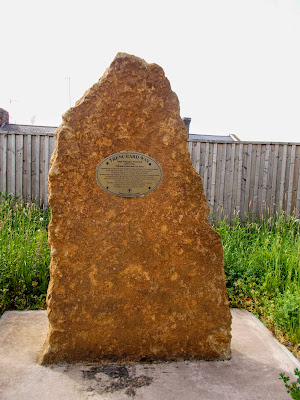Hugh Montague Trenchard is regarded as the "Father of the Royal Air Force". He was born at Windsor Lodge, Haines Hill, Taunton on 3rd February 1873. When he was two years old, his family moved to Courtlands near Norton Fitzwarren and he spent the rest of his childhood there.
Hugh Trenchard didn't do well at school but was granted a commission as second lieutenant in the 2nd Battalion of the Royal Scots Fusiliers in September 1893 and was posted to India. He served in the Boer War 1899-1902 and was promoted to the rank of Captain in February 1900. He was severely injured at Dwarsvlei in the Transvaal in October 1900 and was invalided back to Britain. He recovered and returned to South Africa in May 1901. He then served in Nigeria 1903-1910. He was promoted to major and later to lieutenant colonel. He became seriously ill in 1910 and was sent back to the UK. After recovering, he served in Ulster until 1912.
He learnt to fly aircraft in July 1912 at the Sopwith School of Flying at Brooklands in Surrey and was immediately seconded to the newly formed Royal Flying Corps. In 1913 he was appointed Assistant Commander of the Central Flying School at Upavon in Wiltshire. In August 1915 he was put in charge of the Royal Flying Corps in France. His policy was to launch persistent attacks in order to establish air supremacy.
In January 1918 Hugh Trenchard was appointed as the first Chief of the Air Staff, although he resigned from that post in April of the same year. He was also knighted (KCB). In May 1918 he returned to France as the head of a small force that was intended to bomb targets in Germany, although only a few raids were carried out.
In 1919 Winston Churchill, who was Minister of War and Air, persuaded him to resume his post of Chief of the Air Staff. Hugh Trenchard was created a baronet in October 1919. During the 1920s he founded an apprentice school for ground crews at Halton in Buckinghamshire, a cadet college for career officers at Cranwell in Lincolnshire and a staff college at Andover in Hampshire. He set up University Air Squadrons at Cambridge, Oxford and London in 1925 and introduced short-service commissions. He was knighted again (GCB) in January 1924 and he became the first Marshal of the RAF in 1927.
In 1920 Hugh Trenchard married Katherine Boyle. They had two sons together: Hugh (born 1921 and died in North Africa in 1943) and Thomas (1923-1987).
Hugh Trenchard retired from the RAF on 31st December 1929 and was made a baron the following day. He was Commissioner of the Metropolitan Police 1931-1935, during which time he founded the police college and forensic laboratory at Hendon. He was made a viscount in January 1936. He was then Chairman of the United Africa Company 1936-1953.
Hugh Trenchard died in London on 10th February 1956 and his funeral took place in Westminster Abbey. In July 1961 prime minister Harold Macmillan unveiled a bronze statue of of him by William McMillan outside the Ministry of Defence in Embankment Gardens. A 7-foot high cast bronze statue of him by Vivien Mallock was unveiled at RAF College Cranwell in October 2020 to mark the 100th anniversary of the college.
In 2018 Taunton's new Northern Inner Distributor Road was named Trenchard Way in memory of him. In June 2018 his grandson, Hugh Trenchard, 3rd Viscount Trenchard, unveiled a memorial on Trenchard Way close to Taunton Station.



No comments:
Post a Comment